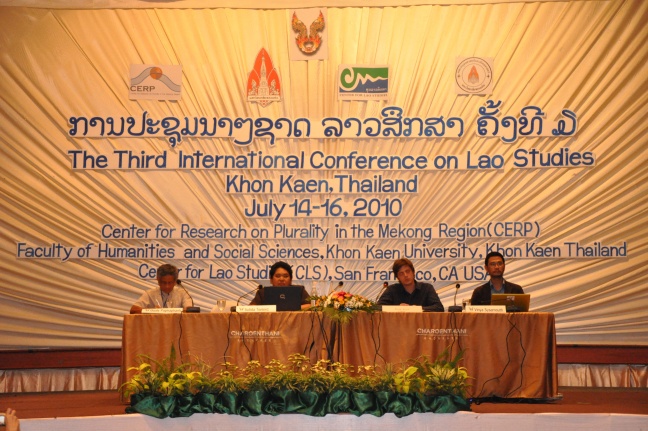It was my first International Conference on Lao Studies, although not my first visit to Khonkaen – last time I was passing through on my way from Viengchan to Ubon Ratchathani. I arrived on the Tuesday afternoon – the airport was very busy with so many conference attendees flying in. I happened to hook up with a group heading to the Charoen Thani Princess Hotel, where the conference was being held. A popular convention hotel, I was impressed by its grand presence, although my room was best described as serviceable.
Wednesday morning the registrations started at 8am, and the opening ceremony – very much “Thai Style” with the provincial governor offering the welcome (or was it a deputy?) The programmed talks extended over two-and-a-half days – yet with 140 presentations it was a crammed program. To make it all happen, some talks were restricted to only 10 minutes! Only a few had as long as half an hour. This was not quite ideal, and I did hear a few concerns expressed about this.
For me, these short talks were not so informative. Much more important was the chance to meet and talk face to face with so many scholars, business people, students, and development workers. Being held in Isarn, it was clear to me that this diverse group of people could speak freely, and take advantage of the opportunities presented by this event. For example, over breakfast one day I overheard Lao expats now living in the West talking about doing business in the Lao PDR. And during the day I noted various Western scholars catching up with Lao PDR colleagues. These days, the Lao people live in many countries, and it is great that they can meet freely like this and still be handy to the PDR.
A highlight for me was the after-dinner speech – on the first night – given by Grant Evans. Grant congratulated the organisers, and expressed his pleasure at seeing so many people attend, yet at the same time he offered very apt observations on Lao related topics that deserve more attention, and which he hoped could be discussed at future meetings, perhaps even within the PDR. Some of these issues include minorities within the PDR, the growing role of China and Vietnam in development and immigration, and the nature of urbanization. This stimulated private discussions afterwards. For example, a participant raised with me the issue of Australian mining companies in the PDR. Later I had opportunity to discuss Grant’s remarks with some Lao PDR people while on the bus to Viengchan. When they agreed with the idea of holding the meeting in the PDR, I asked how this could be possible. “No problems, as long as you submit the text of the papers to the ministry for approval first!”
Another talk that impressed me was by Harold Hundius and David Wharton of the Digital Library of Lao Manuscripts Project. It is very gratifying to see the success of this German funded project, which has opened Lao literary heritage to the world. David particularly stressed that, since everybody has free access to this resource, the entire Lao community can benefit from it.
During the Thursday evening dinner it was announced that the next meeting will be held at the University of Wisconsin-Madison (USA) in 2013, famous for its Lao Studies Program. This is a good decision given that the Lao National University advised (in discussions the day before) that it is not quite ready to hold such a conference. None the less, some individuals, such as my bus companions, expressed disappointment, asking: “why aren’t Lao Studies held in Laos?”
Reflecting on this point, it occurs to me that there is no one legitimate representation of Lao people, culture language etc. There are some 30 million Lao people in the world, spread across many countries. Therefore, Lao studies is necessarily much bigger than the Lao PDR; rather, the PDR is one important factor in a bigger equation.
Finally I want to say that the organisers did a good job, and deserve recognition. It is not easy to run a big conference, and it was great to see that nothing appeared to go wrong (except there was no notification that several speakers would not make it ). If I can afford it, I will gladly go to the next Lao Studies Conference.
[More photos can be viewed here] Facebook
Facebook  Twitter
Twitter  Soundcloud
Soundcloud  Youtube
Youtube  Rss
Rss 